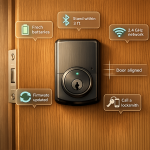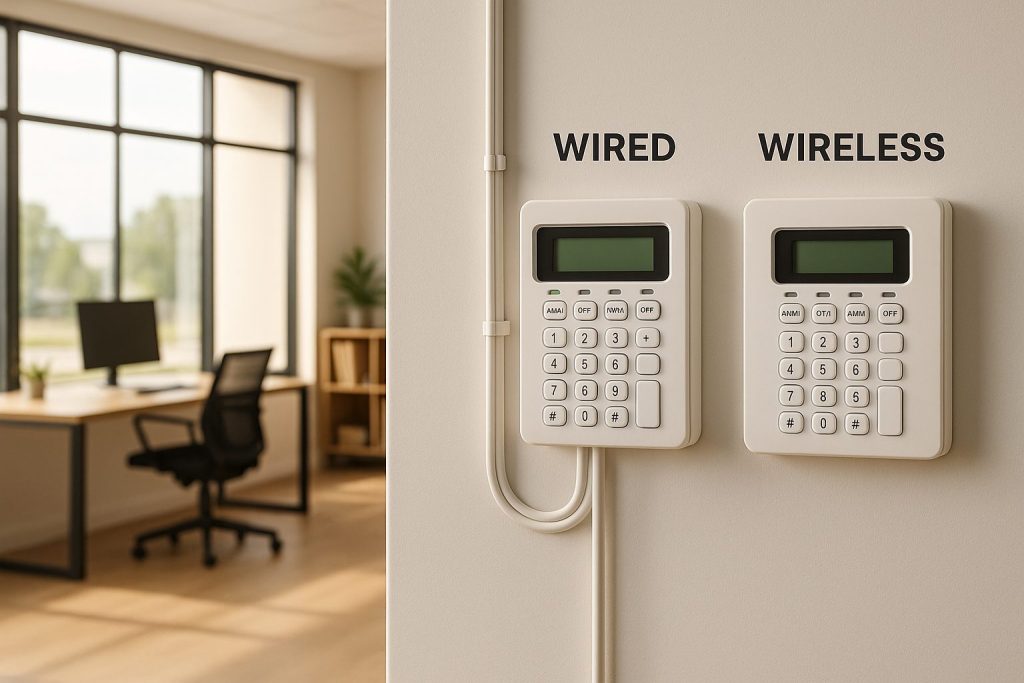When choosing a business alarm system, you’re likely deciding between wired and wireless options. Both have strengths and weaknesses, and the right choice depends on your business’s location, building type, and security needs.
Key Differences:
- Wired systems: Reliable, long-term solutions that use physical cables for communication. They’re less prone to interference but require extensive installation and are harder to modify.
- Wireless systems: Easier to install and expand, making them great for leased spaces or temporary setups. However, they require regular battery maintenance and can face signal challenges in certain environments.
Quick Overview:
- Wired systems: Better for owned buildings and permanent setups.
- Wireless systems: Ideal for leased spaces, historic buildings, or businesses expecting frequent changes.
Your decision should balance reliability, installation complexity, and future needs. Below, we’ll break down how each system works, their pros and cons, and tips for choosing the best option for your business.
Wired vs Wireless Alarm Systems: Expert Advice from Inaxsys Security Systems

Wired Alarm Systems: How They Work and Their Pros and Cons
For businesses seeking a dependable, long-term security solution, wired alarm systems stand out as a reliable choice.
How Wired Alarm Systems Work
Wired alarm systems rely on a network of physical cables that connect sensors, detectors, and control panels throughout a building. These systems operate on a default closed circuit. When a sensor detects an intrusion or fault, the circuit is disrupted, sending a signal to the control panel.
End-of-line (EOL) resistors play a critical role in ensuring tamper detection. Positioned at the end of each circuit, these resistors monitor electrical resistance. If a wire is cut or short-circuited, the change in resistance is immediately noticed, triggering an alarm. This makes it much harder for intruders to disable the system without detection.
Additionally, multiple door and window sensors can be grouped into a single zone. This means the settings for that zone apply to all connected sensors, simplifying the system’s operation while enhancing its reliability.
Benefits of Wired Systems
Wired alarm systems are known for their reliability. Because components communicate via physical connections, they avoid issues like signal interference that can affect wireless systems. They also draw power directly from the building’s electrical system, eliminating concerns about battery life or the recurring expense of replacements.
Security is another strong point. Physical wiring is much harder to hack or disrupt compared to wireless signals, and the EOL resistors ensure tampering attempts are quickly detected. Over time, these systems often prove more economical, as they require less maintenance – usually just software updates rather than hardware replacements. For businesses planning to stay in the same location for years, this can lead to significant savings.
Wired systems also maintain consistent performance regardless of building materials or layout, which can sometimes interfere with wireless signals.
Drawbacks of Wired Systems
Despite their strengths, wired systems come with a few challenges. Installation is a major hurdle. Running cables through walls, floors, and ceilings is a time-consuming process that can take anywhere from several hours to days. The process often requires drilling, which can damage walls – a concern for older or leased buildings where structural changes are restricted.
The upfront costs can be steep. Equipment alone typically ranges from $500 to $1,000, with installation adding another $150 to $500. Once installed, the system is fixed in place, making it difficult to relocate or reconfigure. Expanding the system or adding new zones often involves running additional cables, which can be costly, especially in finished buildings.
While EOL resistors detect tampering, the physical wires themselves remain vulnerable to accidental damage during renovations or even intentional sabotage. Additionally, any changes or upgrades usually require professional assistance, offering little flexibility for DIY adjustments. This can be a drawback for businesses needing quick modifications to their security setup.
Wireless Alarm Systems: How They Work and Their Pros and Cons
For businesses that need a flexible and fast-to-install security solution, wireless alarm systems offer a cable-free alternative that skips the hassle of extensive wiring.
How Wireless Alarm Systems Work
Wireless alarm systems rely on radio frequency (RF) technology to connect sensors, detectors, and control panels. Instead of physical cables, these systems use RF signals, typically operating on frequencies between 900 MHz and 2.4 GHz, to communicate.
When a sensor is triggered, it sends a digital signal to the control panel. From there, the control panel processes the information and can activate alarms, notify monitoring services, or send alerts to business owners via smartphone apps.
Most sensors are powered by batteries that last between two and five years. To enhance security, these systems use encrypted communication to prevent unauthorized access. The control panel itself connects to the internet through Wi-Fi or cellular networks, allowing business owners to manage their systems remotely – whether that means arming or disarming the system or receiving real-time alerts.
Benefits of Wireless Systems
The design of wireless systems offers several practical advantages for businesses.
- Quick installation: Without the need to run cables through walls or ceilings, installation can often be completed in just a few hours. This makes wireless systems perfect for businesses that need immediate security or operate in leased spaces where modifications like drilling aren’t allowed.
- Easy to expand and reconfigure: Adding new sensors or relocating existing ones is straightforward – just mount the device and sync it with the control panel. This flexibility is ideal for businesses that are growing or frequently rearranging their layouts.
- Preserves historic or delicate structures: Wireless systems are a great fit for older buildings where running cables might damage architectural features. They’re also a smart option for temporary business locations since the system can be moved without leaving permanent traces.
- Remote monitoring: Business owners can check their system’s status, receive alerts, and control their security setup from anywhere. Whether you’re across town or traveling, you’ll have peace of mind knowing your system is just a tap away.
- Smart integration: Many wireless systems can connect with other technologies, like lighting, HVAC systems, and access control platforms, creating a more streamlined and efficient setup.
Drawbacks of Wireless Systems
Despite their advantages, wireless systems come with some challenges that businesses should consider.
- Battery maintenance: Each sensor requires regular battery replacements, and for larger systems, this can become a time-consuming task. Neglecting battery upkeep can leave parts of the system nonfunctional, creating security gaps.
- Signal interference: Thick walls, metal structures, or heavy Wi-Fi traffic can disrupt wireless signals, leading to reliability issues. In larger buildings, dead zones may emerge where signals struggle to reach the control panel.
- Higher long-term costs: While installation costs are often lower, ongoing expenses like battery replacements, potential signal boosters, and more frequent updates to components can add up. Additionally, professional monitoring services for wireless systems are often pricier than those for wired setups.
- Vulnerability to jamming: Wireless systems can be susceptible to RF jamming, where intruders use devices to disrupt communication signals. Modern encrypted systems have reduced this risk, but it’s still a concern.
- Environmental challenges: Extreme weather conditions, high humidity, or electromagnetic interference from nearby equipment can weaken signals and shorten battery life, potentially compromising the system’s reliability when it’s needed most.
sbb-itb-643e28e
How to Choose the Right Alarm System for Your Business
Selecting the right alarm system for your business boils down to how well it matches your priorities, budget, and future goals. It’s a careful balancing act between reliability, installation time, and maintenance needs. Below, we’ll break down these factors to help you make the best choice.
Reliability, Installation, and Maintenance Comparison
When comparing alarm systems, three key factors stand out: reliability, installation requirements, and maintenance demands.
Reliability is where wired and wireless systems differ significantly. Wired systems are known for their consistent performance, while wireless systems can face occasional signal issues, especially in buildings with thick walls or heavy electronic interference.
Installation time is another major consideration. Wireless systems are quick to set up, often becoming operational in just 4-6 hours. On the other hand, wired systems take longer – typically 1 to 3 days – because they involve running cables through walls, ceilings, and conduits. For businesses that need immediate security, this time difference can be a dealbreaker.
Maintenance needs also vary. Wired systems are relatively low-maintenance, requiring annual inspections and occasional part replacements. Wireless systems, however, need more attention, including regular battery changes and signal strength checks to ensure everything runs smoothly.
| Factor | Wired Systems | Wireless Systems |
|---|---|---|
| Signal Reliability | Consistent, no interference | Can be affected by materials, weather |
| Installation Time | 1-3 days typical | 4-6 hours typical |
| Upfront Cost | Higher due to labor | Lower installation costs |
| Ongoing Maintenance | Annual inspections | Battery replacements, signal checks |
| Expansion Difficulty | Requires new wiring | Add sensors instantly |
This breakdown highlights the practical differences between wired and wireless systems, helping you see which might align better with your business needs.
When to Choose Wired vs. Wireless Systems
Your business’s unique circumstances will guide your decision.
Wired systems are ideal for businesses that plan to stay in one location for many years, particularly in buildings they own. They’re a great fit for larger facilities where long-term reliability is critical, and where interference-free signals are a must. These systems are often chosen by manufacturing plants, warehouses, and retail stores with sensitive inventory or high-security requirements. Additionally, businesses needing to meet specific insurance or regulatory standards often prefer wired systems for their proven dependability.
On the other hand, wireless systems are perfect for businesses in leased spaces where permanent modifications aren’t allowed or practical. They’re also a smart choice for companies that anticipate frequent relocations, expansions, or layout changes. Wireless systems are especially valuable for small to medium-sized businesses that need quick security coverage, such as new retail locations or temporary offices. Service-based businesses, medical practices, and companies housed in historic buildings – where drilling and wiring are challenging – often benefit from wireless options. Plus, businesses with multiple locations appreciate the convenience of standardized, remotely managed wireless systems.
Special Considerations for Pittsburgh Businesses
Local factors in Pittsburgh add another layer to your decision-making process. The city’s mix of historic and modern buildings creates unique challenges for alarm system installations.
Building age and construction are crucial considerations. Many of Pittsburgh’s commercial buildings, especially in areas like the Strip District, Lawrenceville, or downtown, feature thick brick walls and steel frameworks. These materials can interfere with wireless signals but also make wiring installations expensive and disruptive. A professional assessment can help businesses in these areas determine the most practical solution.
Weather conditions in Pittsburgh also play a role. The city’s seasonal temperature swings – from hot summers to frigid winters – can affect wireless system batteries, potentially leading to more frequent replacements during extreme weather. Wired systems avoid this issue but may require extra protection for outdoor components exposed to harsh conditions.
Growth and expansion plans are another factor to keep in mind. With the city’s revitalized neighborhoods and growing tech sector, many businesses are expanding rapidly. If your company expects to double its space in the near future, a wireless system might offer a more flexible and cost-effective solution. Conversely, an established manufacturer with a long-term presence might see greater value in investing in a wired system.
Local regulations and insurance requirements can also influence your decision. Some Pittsburgh insurance providers offer discounts for specific system types, so it’s worth checking with your carrier. Additionally, businesses in regulated industries should ensure their chosen system meets any applicable federal or state compliance standards.
Professional Installation and Support in Pittsburgh, PA
Selecting the right alarm system is just the first step. Its effectiveness ultimately depends on how well it’s installed and maintained. A poor setup can leave even the best system vulnerable, which is why professional installation and ongoing support are so important.
With professional installation, you can trust that your system will work as intended. Skilled technicians handle everything from routing cables in wired systems to placing sensors in the perfect spots for wireless setups. This is especially important in a city like Pittsburgh, where historic and industrial buildings can pose unique challenges. These experts ensure your security system is customized to meet your specific business needs.
Sherlock’s Locksmith: Commercial Security System Services

Local experience makes a difference, and Sherlock’s Locksmith has been serving Pittsburgh businesses with tailored security solutions for years. Their team specializes in both wired and wireless alarm system installations, offering flexible options to suit your building’s requirements and your business’s needs.
Sherlock’s Locksmith doesn’t just stop at installation. Their certified technicians use advanced tools to manage even the most complex setups. Whether it’s a small office in Shadyside or a sprawling warehouse in the Strip District, they design and implement systems that deliver dependable security.
What sets professional installation apart is the precision and care taken during the process. Technicians meticulously test every component, confirm signal strength throughout the facility, and ensure seamless communication between sensors and the control panel. They also handle the technical work of connecting your system to monitoring services and setting up mobile alerts, saving you from the hassle.
Custom Security Recommendations for Each Business
No two businesses are the same, so security solutions shouldn’t be either. Professional providers take the time to assess your facility thoroughly, considering everything from entry points to high-value assets and daily operations.
For example, a medical office with strict privacy needs will require a different setup than a retail store focused on theft prevention. A manufacturing plant with heavy machinery might benefit from robust wired connections, while a consulting firm in a leased space may find wireless systems more practical.
Local factors unique to Pittsburgh also come into play. Technicians account for the city’s weather, ensuring outdoor components are protected, and they identify the best spots for control panels in buildings with distinctive architectural features. They also ensure your system complies with local regulations and insurance requirements.
Trained Technicians for Both System Types
Modern alarm systems are sophisticated, and their installation requires specialized expertise. Certified technicians bring in-depth knowledge of system components, installation methods, and troubleshooting for both wired and wireless setups.
For wired systems, they ensure compliance with electrical codes, proper cable management, and seamless integration with existing infrastructure. They also handle critical details like grounding and surge protection.
When it comes to wireless systems, technicians are well-versed in radio frequency principles, interference mitigation, and sensor placement to maximize reliability. They stay updated on the latest wireless technologies and security protocols to safeguard your system against emerging threats.
Ongoing support is just as critical as installation. Professional technicians provide regular maintenance, including battery replacements for wireless systems, software updates, and system testing. They’re also available for emergency repairs, quickly diagnosing and resolving issues to minimize downtime and keep your business secure.
The real value of professional support shines when problems arise. Instead of wasting hours troubleshooting why a sensor isn’t working or why your system isn’t communicating, you can rely on experts to handle it efficiently. This ensures your system stays operational with minimal disruption.
Additionally, certified technicians keep pace with industry advancements. As new features and technologies emerge, they can guide you in upgrading your system or adding capabilities without needing a complete overhaul.
Conclusion
When it comes to choosing between wired and wireless security systems, each offers distinct advantages tailored to specific business needs and environments. Here’s a quick recap to help guide your decision.
Key Takeaways
Wired systems are known for their reliability and consistent performance. They don’t rely on batteries, are resistant to interference, and ensure steady communication between components. However, they come with more complex installation requirements, including cable routing, and can be harder to modify or expand later.
Wireless systems, on the other hand, stand out for their flexibility and ease of installation. They’re ideal for businesses in leased spaces, historic buildings where cabling is impractical, or companies that frequently relocate. While they do require regular battery maintenance and may encounter interference issues, advancements in wireless technology have greatly improved their reliability and security.
The choice largely depends on factors like your building type, ownership status, and future plans. Consider these points:
- Permanent vs. temporary locations: Wired systems work well for owned properties, while wireless systems are better suited for leased spaces.
- Installation requirements: Wireless systems are quicker to set up, while wired systems demand more extensive cable routing.
- Maintenance needs: Wired systems require minimal upkeep, whereas wireless systems need regular battery replacements.
- Growth potential: Wireless systems are easier to expand, while modifying wired systems can be costly.
Starting Your Security Journey
Choosing the right system is about balancing reliability, ease of installation, and ongoing maintenance. A professional assessment can help identify the best, most cost-effective solution for your specific needs.
Your building’s structure and future plans should guide your decision. Professional security experts can evaluate your property, pinpoint potential interference for wireless systems, assess cable installation feasibility for wired systems, and recommend solutions that align with your budget and timeline.
For businesses in Pittsburgh, working with local experts like Sherlock’s Locksmith provides a distinct advantage. Their familiarity with the city’s unique architecture and regulations ensures a tailored approach. With certified technicians experienced in both wired and wireless systems, they can design a security solution that matches your operational needs while protecting your business effectively.
FAQs
What should businesses consider when choosing between wired and wireless alarm systems?
When deciding between wired and wireless alarm systems for your business, there are a few key factors to weigh, including reliability, cost, and installation requirements.
Wired systems are known for their dependable, steady connections, making them less susceptible to interference. That said, they often come with a higher upfront cost and require more complex installation – think running cables through walls. While the initial setup might be more involved, these systems tend to save money in the long run due to lower maintenance needs.
Wireless systems, by contrast, are much simpler to install and offer flexibility, especially for businesses that might relocate or need a setup that can grow with them. These systems are perfect for dynamic spaces but could occasionally face signal interference.
To choose the right option, think about your business’s unique needs – like the size of your property, future growth plans, and your budget. For expert advice and installation, Sherlock’s Locksmith in Pittsburgh, PA, provides tailored security system solutions to keep your business secure.
What are the best options for installing alarm systems in historic or leased commercial buildings?
Installing alarm systems in historic or leased buildings comes with unique challenges, especially when preserving the structure or avoiding permanent changes is a priority. This is where wireless alarm systems shine. They don’t require invasive drilling or complex wiring, making them a great option for safeguarding historic properties without risking damage to walls or other architectural details.
For leased properties, wireless systems offer another big advantage – they’re incredibly easy to set up, take down, or move to a new location without altering the property. There’s also the option of hybrid systems, which combine both wired and wireless components. These systems are a smart choice for businesses looking for a mix of flexibility and reliability. Both wireless and hybrid setups provide effective security solutions while respecting tenant agreements and maintaining the building’s original condition.
What are the risks of signal interference in wireless alarm systems, and how can businesses prevent them?
Wireless alarm systems occasionally run into signal interference, which happens when external devices disrupt the communication between the system’s components. This disruption can stem from jamming devices or overlapping signals operating on the same frequency, potentially causing the system to malfunction.
To minimize these issues, look for systems that use multiple frequencies or are built to resist jamming attempts. Routine maintenance is also crucial – check that batteries, sensors, and other components are functioning properly. Choosing systems with interference detection features is another smart move, as they can alert you to disruptions and give you the chance to act quickly to protect your business.









